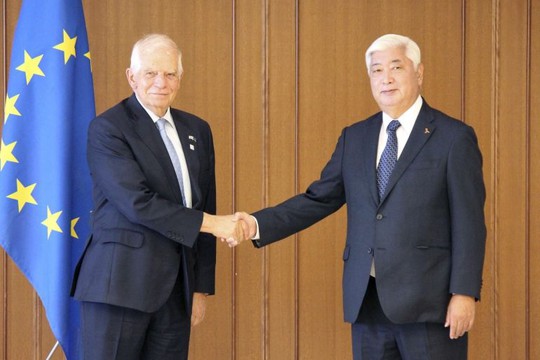EU’s foreign policy chief Josep Borrell shakes hands with Japan’s Defence Minister Gen Nakatani in Tokyo, Japan.
Photo: Kyodo
Japan and the European Union announced a sweeping new security and defence partnership in Tokyo on Friday, ‘France24’ reports.
The EU High Representative for Foreign Affairs and Security Policy/Vice-President of the European Commission, Josep Borrell, travels to Japan and the Republic of Korea from 1 to 4 November.
Ahead of the visit, Borrell said: “My visit to two of our closest partners in the Indo-Pacific is a key milestone in our efforts over the past five years to strengthen the EU’s active engagement in the Indo-Pacific. We have secured alignment on geopolitical issues and advanced the values we share. It is a privilege to be able to travel in these last months of my mandate to both Tokyo and Seoul, not to say farewell, but to open a new chapter in our ever-closer relations.”
Borrell and his Japanese counterpart Takeshi Iwaya unveiled the pact to develop cooperation on joint military drills, the exchange of information related to the defence industry, and space security among other matters.
"I am extremely pleased to be here with Minister Iwaya to announce the conclusion of this security and defence partnership between the European Union and Japan," Borrell said.
He called it the "the first agreement of this nature" the EU has made with an Asia-Pacific country, describing it as "historical and very timely".
"We live in a very dangerous world" and "given the situation in both of our regions, this political framework deepens our ability to tackle emerging threats together", Borrell told reporters.
The text of the EU-Japan Security and Defence Partnership, seen by AFP, said they would promote "concrete naval cooperation" including through activities such as joint exercises and port calls, which could also include "mutually designated third countries".
It also said the EU and Japan would discuss "the development of respective defence initiatives including exchange of information on defence industry-related matters".
Japan, which for decades has relied on the United States for military hardware, is also developing a new fighter jet with EU member Italy and Britain set to be airborne by 2035.
Japan is ramping up defence spending to the NATO standard of two percent of GDP by 2027, partly to counter China, which is increasing military pressure on Taiwan.
Japanese Prime Minister Shigeru Ishiba, who could head a minority government after a disastrous general election last week, has said that "today's Ukraine could be tomorrow's East Asia".
Ishiba has also called for the creation of a NATO-like regional alliance with its tenet of collective security, although he has conceded this will "not happen overnight".
Borrell and Iwaya also shared “grave concern” about Russia’s deepening military cooperation with North Korea, including the North’s troop deployment to Russia and arms transfers between the two countries, according to an EU statement. The two officials reiterated their commitment to supporting Ukraine and condemned Russian aggression.
Japan, under a new security strategy adopted in 2022, has been rapidly accelerating its military buildup through its alliance with the United States, its only treaty ally, and other partners, including Australia, the United Kingdom and a number of European and Asia Pacific countries, to deter an increasingly assertive China.
Earlier on Friday, Borrell met Japanese Defence Minister Gen Nakatani and shared the view that security in Europe and the Asia Pacific is interconnected as they agreed to deepen defence cooperation, Japan’s Ministry of Defence said in a statement.
“We reaffirmed the need for strengthened EU-Japan cooperation in security and defence, including on maritime security, cyber and hybrid threats amid growing regional and global security challenges,” Borrell said on the social media platform.
…In connection with Borrell's visit to East Asia, the following can be noted.
First, Borrell is the head of EU diplomacy, but he is currently dealing with military issues, which is not part of the classical understanding of diplomacy. It means that Europe is abandoning diplomacy in favor of militarism.
Second, the EU is feverishly looking for new allies in Asia, since the EU fears that the US will soon abandon them.
Third, the "Brussels-Tokyo Axis" is reminiscent of the "Berlin-Tokyo Axis" created during World War II by Nazi Germany and militaristic Japan, the organizers of that Great War of the 20th century. Does this new military cooperation agreement between the EU and Japan mean that Europe intends to repeat the events of 100 years ago and once again lead Europe to collapse?
read more in our Telegram-channel https://t.me/The_International_Affairs

 10:45 03.11.2024 •
10:45 03.11.2024 •























